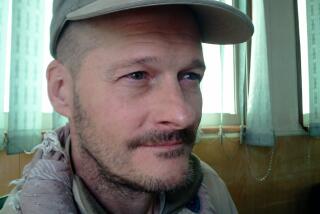Exiled King, U.N. Envoy to Join Forces
- Share via
ROME — A senior U.N. envoy and Afghanistan’s 87-year-old exiled king agreed Wednesday to combine their U.S.-backed efforts to assemble a broad alliance of Afghans to replace the Taliban.
The former monarch’s 6-week-old plan to form a government-in-waiting has faltered because of meddling by Afghanistan’s neighbors, rival ambitions of Afghan opposition leaders and the inability of royal advisors to mediate. The lack of a clear alternative to the Taliban is widely viewed as one obstacle to the U.S.-led military effort to oust the radical Islamic regime.
U.N. envoy Lakhdar Brahimi met with Mohammad Zaher Shah at the octogenarian exile’s villa outside Rome. The hourlong session marked a shift in the anti-Taliban struggle, with the former king ceding to the United Nations the task of coordinating the disparate Afghan political forces.
In turn, Brahimi acknowledged that Zaher Shah, a unifying figure who ruled his multiethnic country for 40 years until a 1973 coup, should play a figurehead role at the center of any post-Taliban order “to take Afghanistan out of its history of division and fracture.”
The diplomat is making the United Nations’ first foray into Afghan politics since the Sept. 11 terror attacks on the U.S. and the Taliban’s refusal to surrender the accused mastermind, Osama bin Laden. Brahimi, a former Algerian foreign minister, resigned in frustration from a U.N. mission to pacify Taliban-ruled Afghanistan in 1999.
Before arriving here Wednesday, Brahimi had met over the past week with the leaders of Pakistan and Iran, which support rival Afghan factions. He returns to New York today to brief U.N. Secretary-General Kofi Annan on his evolving plan for a transition to post-Taliban rule. On Monday, he will present the proposal to the foreign ministers of Afghanistan’s six immediate neighbors plus the United States and Russia.
Brahimi’s U.N. colleague Fransesc Vendrell, meanwhile, is heading to Dushanbe, Tajikistan’s capital, for talks with leaders of the anti-Taliban Northern Alliance.
If Brahimi wins approval from the “six plus two” group and the U.N. Security Council, he will make a second tour of South Asia with specific proposals on the makeup of a broad-based provisional Afghan government.
He has emphasized that agreement will be difficult. “We have to talk to a large number of people before we can even start talking about precise steps,” he told reporters in Pakistan last week.
Counting on the Taliban’s eventual defeat, the United States and Britain have urged Brahimi to move quickly on the political front and to assemble a U.N. peacekeeping force for Kabul, the Afghan capital.
Brahimi said in Tehran on Tuesday that he would prefer to have an Afghan force secure Kabul, possibly in combination with a coalition of willing countries acting under U.N. mandate.
But his immediate priority, he said, is to tackle the geopolitical rivalries that have hindered nation-building in Afghanistan for more than a decade.
Pakistan, which helped the Taliban take power in 1996 and backed it until the Sept. 11 attacks, is demanding a role for pro-Pakistan defectors from the religious movement in a future Afghan government. The Taliban is led by Pushtuns, Afghanistan’s largest ethnic group.
Iran, Russia and India oppose a role for Taliban figures and are helping the United States support the Northern Alliance, which is dominated by ethnic Tajiks, Uzbeks and Hazaras and controls about 10% of Afghanistan’s territory.
The former king, who is Pushtun, struck a deal with the Northern Alliance on Oct. 1 to join him in naming a broadly representative Supreme Council of National Unity. It would run the country until it could convene a larger loya jirga, or traditional Afghan assembly, to elect a post-Taliban government.
But the Northern Alliance has balked at a second meeting with the ex-king’s advisors--to pick the council’s 120 members--because of opposition by its leader, former President Burhanuddin Rabbani, who ran the country from 1992 to 1996 and still considers himself president.
Brahimi told reporters that he saw hopes for a compromise after his talks in Pakistan and Iran. But he said the Iranians, who abolished their own monarchy 22 years ago, are “not supportive enough” of a key role for the former Afghan king.
Zaher Shah’s exact role “will emerge as we go along,” Brahimi said, emphasizing the ex-king’s disavowal of claims to the monarchy.
“He doesn’t want anything for himself,” the diplomat said. “He is willing to help in the manner that he considers useful and acceptable to everybody. We believe that he can indeed play that role of being at the center of the arrangements that need to be made.”
Zalmai Rassoul, the exiled monarch’s secretary, acknowledged that the U.N. envoy “is now the head of the process” of shaping a post-Taliban order but is “very supportive” of the former king’s idea that Afghans should determine their own future.
Another royal aide, speaking on condition of anonymity, voiced skepticism about the U.N. effort and Brahimi, who has been dismissive of the former king in the past.
“Anything that seeks to diminish the role of Afghans and tries to balance neighboring countries’ interests is problematic,” he said. “There is no track record that this can work. Remember, Brahimi tried something like this two years ago and gave up.”
More to Read
Sign up for Essential California
The most important California stories and recommendations in your inbox every morning.
You may occasionally receive promotional content from the Los Angeles Times.













